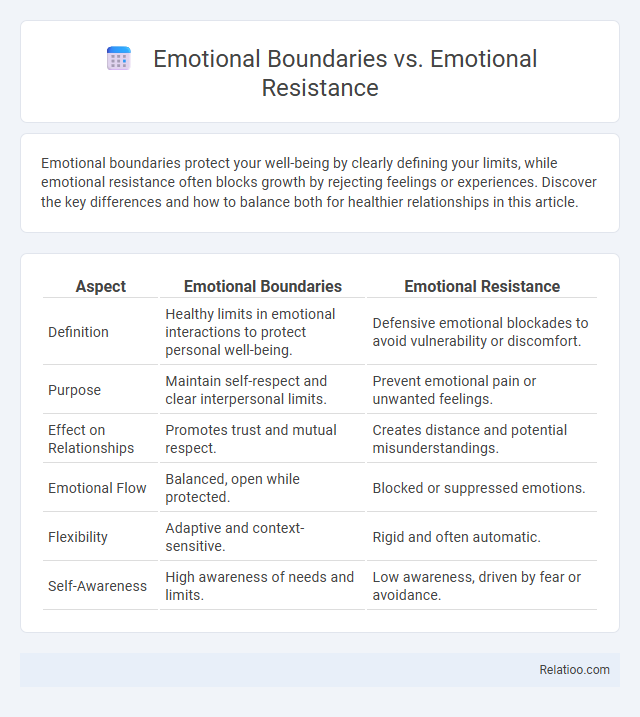Emotional boundaries protect your well-being by clearly defining your limits, while emotional resistance often blocks growth by rejecting feelings or experiences. Discover the key differences and how to balance both for healthier relationships in this article.
Table of Comparison
| Aspect | Emotional Boundaries | Emotional Resistance |
|---|---|---|
| Definition | Healthy limits in emotional interactions to protect personal well-being. | Defensive emotional blockades to avoid vulnerability or discomfort. |
| Purpose | Maintain self-respect and clear interpersonal limits. | Prevent emotional pain or unwanted feelings. |
| Effect on Relationships | Promotes trust and mutual respect. | Creates distance and potential misunderstandings. |
| Emotional Flow | Balanced, open while protected. | Blocked or suppressed emotions. |
| Flexibility | Adaptive and context-sensitive. | Rigid and often automatic. |
| Self-Awareness | High awareness of needs and limits. | Low awareness, driven by fear or avoidance. |
Understanding Emotional Boundaries
Understanding emotional boundaries involves recognizing and respecting personal limits regarding feelings, ensuring healthy interactions and self-care. Emotional resistance refers to an unconscious defense mechanism where individuals avoid or suppress emotional experiences, often hindering personal growth and authentic connections. Distinguishing emotional boundaries from emotional resistance allows for better emotional regulation and improved mental well-being by promoting awareness of when to engage or protect one's emotional space.
Defining Emotional Resistance
Emotional resistance refers to the subconscious defense mechanism where individuals block or avoid processing certain emotions to protect themselves from psychological discomfort or trauma. Unlike emotional boundaries, which are conscious limits set to maintain healthy relationships, emotional resistance often leads to suppressed feelings and unresolved internal conflicts. Understanding emotional resistance involves recognizing avoidance patterns that hinder emotional growth and self-awareness.
Key Differences Between Boundaries and Resistance
Emotional boundaries serve as healthy limits that protect your mental and emotional well-being by defining what you are willing to accept from others, whereas emotional resistance involves an unconscious defense mechanism that blocks emotional experiences or growth. Resistance often manifests as avoidance or denial, preventing genuine connection and self-awareness, while boundaries promote respect and clear communication. Understanding these key differences empowers you to foster healthier relationships and emotional resilience.
Signs You’re Setting Healthy Boundaries
Recognizing signs you're setting healthy emotional boundaries includes feeling comfortable expressing your needs without guilt, maintaining respect for your own feelings while interacting with others, and knowing when to say no to protect your mental well-being. Emotional resistance often involves defensive reactions to perceived threats or discomfort, unlike healthy boundaries that promote mutual respect and self-care. Your ability to differentiate between emotional boundaries and resistance helps foster balanced relationships and emotional resilience.
Indicators of Emotional Resistance
Emotional resistance is characterized by a refusal to acknowledge or express feelings, often manifesting as denial, avoidance, or suppression of emotional experiences. Indicators include persistent defensiveness, difficulty accepting feedback, and an unwillingness to engage in vulnerable conversations. Recognizing these signs helps you differentiate emotional resistance from healthy emotional boundaries, which protect your well-being without blocking emotional awareness.
The Impact on Relationships
Emotional boundaries protect individual well-being by clearly defining personal limits, fostering trust and respect in relationships, while emotional resistance often manifests as defense mechanisms that hinder open communication and emotional intimacy. Resistance, whether emotional or behavioral, can create barriers, increasing misunderstandings and conflict, ultimately weakening relational connections. Healthy emotional boundaries enable partners to engage authentically without feeling overwhelmed or invaded, promoting long-term relationship stability and mutual growth.
Emotional Boundaries and Personal Growth
Emotional boundaries are essential for personal growth as they help individuals define and protect their emotional well-being by recognizing limits in relationships and interactions. Unlike emotional resistance, which often involves shutting down or avoiding emotional experiences, healthy emotional boundaries promote self-awareness and resilience. Establishing clear emotional boundaries empowers individuals to engage authentically with others while maintaining their own mental health and fostering sustainable personal development.
Overcoming Emotional Resistance
Overcoming emotional resistance involves recognizing and dismantling the barriers that prevent authentic emotional expression, distinguishing it from emotional boundaries which serve as healthy limits for self-protection. Emotional resistance often manifests as defensive reactions or denial of feelings, blocking personal growth and meaningful connections. Strategies like mindfulness, therapy, and self-reflection help in gradually reducing resistance, enabling emotional openness and resilience.
Strategies for Healthy Emotional Boundaries
Emotional boundaries are essential for maintaining your mental well-being by clearly defining what emotions you are willing to accept and share with others, while emotional resistance often involves pushing away feelings to avoid vulnerability. Effective strategies for healthy emotional boundaries include self-awareness practices, such as recognizing your emotional limits, and assertive communication that respectfully conveys your needs without shutting down or resisting emotions entirely. Developing these boundaries helps you manage relationships with empathy and protects your emotional energy from being overwhelmed or exploited.
Balancing Openness and Protection
Emotional boundaries define the limits you set to protect your well-being while maintaining openness to meaningful connections. Emotional resistance occurs when you unconsciously block feelings to avoid vulnerability, hindering authentic relationships and personal growth. Balancing your emotional boundaries with openness prevents emotional resistance, allowing you to engage deeply without compromising your psychological safety.

Infographic: Emotional Boundaries vs Emotional Resistance
 relatioo.com
relatioo.com